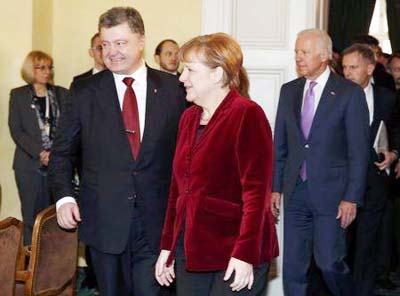
Reuters, Munich :NATO and Russia failed to narrow their differences over the Ukraine crisis in talks on Saturday but agreed they would keep talking to each other.The alliance’s Secretary-General Jens Stoltenberg held a 40-minute meeting with Russian Foreign Minister Sergei Lavrov on the Ukraine conflict, which has caused the worst crisis in East-West relations since the Cold Wara a generation ago.”It’s clear that we assess the situation in Ukraine in very different ways,” Stoltenberg told reporters after the meeting took place on the sidelines of the Munich Security Conference. Russia and NATO, which tried after the Cold War to build a more cooperative relationship, have hurled accusations at each other since Russia’s annexation of Ukraine’s Crimea last March.That prompted NATO to suspend practical cooperation with Moscow. Western countries followed up with sanctions on Moscow.NATO accuses Russia of sending troops to support pro-Moscow separatists in eastern Ukraine, a charge the Kremlin denies.”He (Lavrov) re-stated some of the well-known Russian positions and that just confirms that we have very different assessments about what has happened … and what caused the conflict in Ukraine and also the increased tensions between Russia and NATO,” Stoltenberg said.He said he had voiced deep concern to Lavrov about the “very critical and serious situation” in Ukraine and underscored Russia’s responsibility for the situation because of its support for the separatists.He urged support for the French and German drive to reach a peace accord in eastern Ukraine and stressed the importance of respecting any agreement that was reached.Lavrov did not immediately comment on the talks.Stoltenberg said NATO and Russia had agreed to keep channels of political contact open and NATO would also keep open military communication channels with Russia.Experts say more frequent Russian air and sea patrols close to the borders of NATO countries have raised the risk of an accident or clash. Germany has urged NATO to set up an early warning system with Russia to prevent any military accident from spiraling out of control.MUNICH (Reuters) – NATO and Russia failed to narrow their differences over the Ukraine crisis in talks on Saturday but agreed they would keep talking to each other.The alliance’s Secretary-General Jens Stoltenberg held a 40-minute meeting with Russian Foreign Minister Sergei Lavrov on the Ukraine conflict, which has caused the worst crisis in East-West relations since the Cold Wara a generation ago.”It’s clear that we assess the situation in Ukraine in very different ways,” Stoltenberg told reporters after the meeting took place on the sidelines of the Munich Security Conference.Russia and NATO, which tried after the Cold War to build a more cooperative relationship, have hurled accusations at each other since Russia’s annexation of Ukraine’s Crimea last March.That prompted NATO to suspend practical cooperation with Moscow. Western countries followed up with sanctions on Moscow.NATO accuses Russia of sending troops to support pro-Moscow separatists in eastern Ukraine, a charge the Kremlin denies.”He (Lavrov) re-stated some of the well-known Russian positions and that just confirms that we have very different assessments about what has happened … and what caused the conflict in Ukraine and also the increased tensions between Russia and NATO,” Stoltenberg said.He said he had voiced deep concern to Lavrov about the “very critical and serious situation” in Ukraine and underscored Russia’s responsibility for the situation because of its support for the separatists.He urged support for the French and German drive to reach a peace accord in eastern Ukraine and stressed the importance of respecting any agreement that was reached.Lavrov did not immediately comment on the talks.Stoltenberg said NATO and Russia had agreed to keep channels of political contact open and NATO would also keep open military communication channels with Russia.Experts say more frequent Russian air and sea patrols close to the borders of NATO countries have raised the risk of an accident or clash. Germany has urged NATO to set up an early warning system with Russia to prevent any military accident from spiraling out of control.

